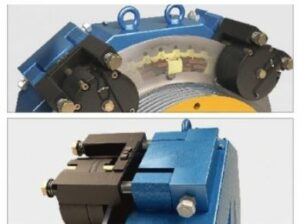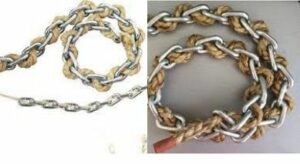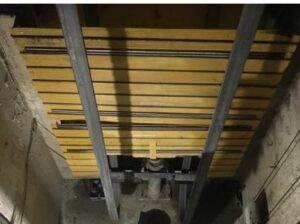Elevators are used every day in offices and households. Thus, in addition to aesthetics, and high safety, these elevators’ comfort must be assured. The elevator noise not only causes nervousness but also discomfort for users. What are the causes of these elevators’ noise? Do these noises affect elevators’ safety? Please read and refer to the sharing from elevator experts of Viet Chao.
Nội dung
Elevator noise due to brake errors
Cause: some elevator series have brake coil structures arranged to wrap the drum of the engine. When the spring is closed, the force generated is extremely strong. Additionally, due to long-term use, displacement, and frictional wear, the gap between the brake pad and engine is larger than the specified level. Thus, when the brake is closed, the pad will hit the engine’s drum and cause loud noise.
Solution: to reduce the noise, you need to re-adjust the gap between the brake pad and the engine’s interface to reach 0.10-0.12mm and the lower and upper variance to within .020.20mm.
Are you wondering whether the brake coil can be wrapped to insulate and reduce the noise? The answer is no.
However, Shanghai Mitsubishi elevator company had a more radical solution by using Mute Brake Control Technology. This technology was updated for series LEHY-III onwards.
Compared to traditional open-loop voltage control technology, closed-loop brake control is used to control speed and brake torque more accurately in all brake phases. This technology reduces the noise significantly and brings comfort when utilized.

Elevator noise due to compensation chain errors
The compensation chain is a balancing component, that allows the elevator to run peacefully and safely. The compensation chain contains the main component of steel and the wrap part is the rope or synthetic rubber. Rope-wrapped compensation chains are commonly used for cargo lifts, low-speed elevators, and low-rise buildings because of their lower cost. In contrast, flat cable compensation and rubber-coated compensation chains are more expensive and are consistently used for high-risk, high-load elevators.

Cause: The elevator’s noises may be caused by the torsion of the compensation chain, by a slack chain touching the chain stopper, or by the links touching each other while the elevator is running.


Solution: Check the condition of the compensating chain to see if it is tensioned. This should be checked after installation and periodically during maintenance.
Some customers wonder whether the compensation chain should be replaced with a rubber cover. It is not necessary because the noise from the compensation chain is very small.
Elevator noise due to relay and contactor
Cause: When the elevator starts and stops, the relay and the contactor will close the contact, creating noise. In some domestic elevator series, the contactor is not covered with soundproofing, so the noise tends to be louder.
Solution: For elevators with a machine room, the machine room needs to be built properly, it is necessary to seal the cable hole and the tractor so that the noise does not spread to the bottom of the pit. For elevators without the machine room, the control cabinet is placed directly above the roof of the cabin or at the door of the top floor, it is necessary to carefully wrap the positions of contactor with the sound-absorbing materials.
For Shanghai Mitsubishi’s LEHY-MRL without machine room elevator series, all contactors have been carefully wrapped sound-absorbing from the factory. Thus, the passengers won’t hear any contactor’ noise.
Noise due to screw’s deficient lubrication
Cause: The screw elevator operates on the principle of articulation between the screw and the screw nut. The screw is placed vertically along the elevator and behind the control panel in the cabin. Most screw elevators do not have a cabin wall, so the users will hear the noise directly from the operation of the screw. However, this is a normal operation. If the elevator makes an unusually loud noise, it may be caused by the insufficient lubrication screw.
Solution: Check the oil quality and the lubrication condition for the screw. Change oil if necessary.
Since screw technology is constantly changing, this noise has decreased. With the Arealift screw homelifts provided by Viet Chao, the noise remains at a very low level, only 47dB, which is equal to the noise emitted by a refrigerator when the compressor is running. In July 2021, Arealift will introduce noiseless screw elevators to the market. This exclusive technology promises to be a “heavy weapon” of the company, giving users a better experience.
Noise due to hydraulic pump deterioration
Cause: The hydraulic elevator operates on the principle of using the oil force to push the piston in the cylinder up and down, pulling the elevator cabin in the same direction. When the pump runs, it pushes the oil into the cylinder and makes noises. The noise is frequently more noticeable when the elevator operates in the direction of the piston thrust. If the hydraulic lift makes an unusually loud noise, the pump may have broken down.
Solution: Check the pump operation.
According to the design of LiftingItalia’s hydraulic elevator, the oil pump engines are very smart and compact. Thus, it can be neatly placed in the pump cabinet, hidden under the stairs, or basement… Since the pump box is made from soundproof materials, the noise has also been minimized.
If you see any unusual noises with the elevator, please contact Viet Chao’s Hotline – 0906 007 700 – for timely support.
You may be interested in other articles: https://vietchao.vn/en/lehy-mrl-ii-officially-launched-in-replacement-of-lehy-mrl/
